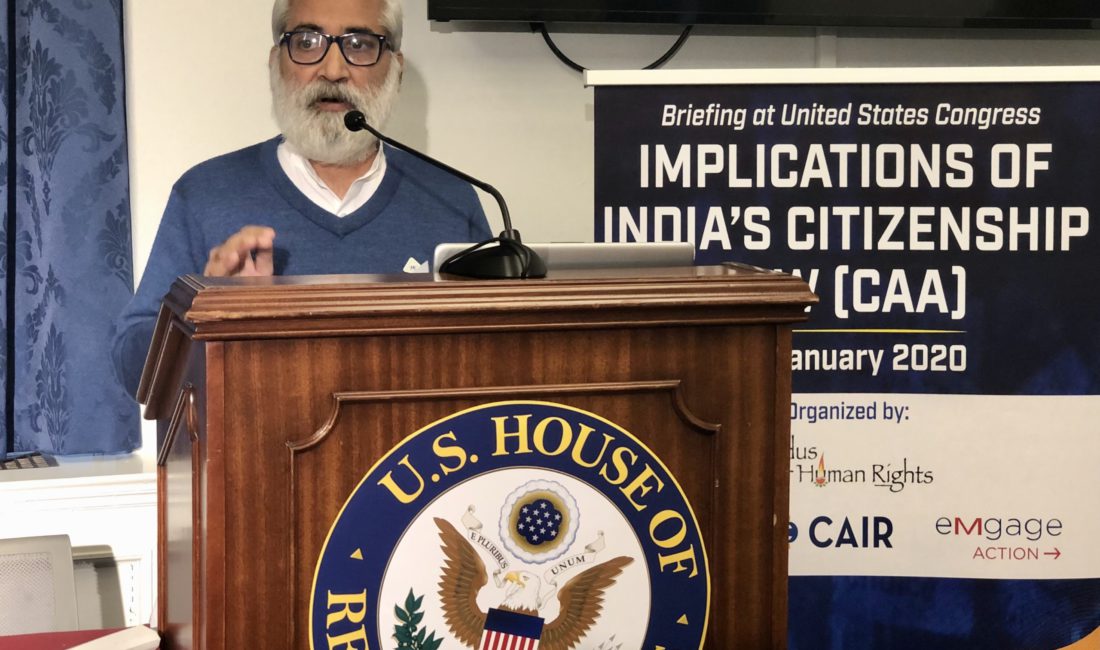Indian government has become people’s enemy, Magsaysay Award winner Sandeep Pandey tells U.S. Congress
Washington, D.C., January 29, 2020
India’s government has become “the enemy of the people” who are protesting the Citizenship (Amendment) Act (CAA), Magsaysay Award winning civil rights activist from India, Sandeep Pandey, said at a briefing at the United States Congress this week.
The police have especially been targeting the Muslims even though those protesting the new citizenship law have included members of all faiths, Pandey said at the briefing, “Implications of India’s Citizenship Law (CAA)”, held here on Monday.
“In 27 years of working as an activist I have experienced unprecedented curb on fundamental rights of freedom of expression, to assemble peaceably and to move about anywhere within India over the past six months,” Pandey said.
He himself was put under house arrest in his hometown Lucknow twice in August when he planned a public event against the government’s crackdown in Kashmir, and again in December to protest the CAA. In August and this month, the police stopped him from visiting Ayodhya, where a Hindu temple is being built on the ruins of a mosque.
“The ruling Bhartiya Janata Party government doesn’t want any alternative view on Kashmir, or CAA to be expressed,” Pandey said. “The Government has become the enemy of people who participated in protests against the CAA.”
He said that although “common citizens” including non-Muslims have participated in the anti-CAA protests throughout India, the police and the administration have targeted “only Muslims to create an impression that it was the Muslims who created trouble.”
Pandey also criticized Prime Minister Narendra Modi for saying that those who indulged in violence “can be recognized from their dress.”
The police and masked civilians attacked the Muslims and indulged in vandalism, arson and looting. Yet, the police filed FIRs (police complaints) against the Muslims. “The pattern is clear. The modus operandi is to make the victims the accused,” Pandey said. Of the more than 1,000 people now in jail, most were Muslims.
Monday’s briefing was attended by officials from Congressional committees as well as the offices of at least 20 Members of Congress, including seven senators. Officials from the Department of State, which implements US foreign policy, were also in attendance.
The Briefing was organized by Indian American Muslim Council, the largest US advocacy group for Indian Americans working on the protection of minorities in India; Hindus for Human Rights; Emgage Action; and Council on American-Islamic Relations.
Pandey said the police lobbed tear gas shells and stun grenades at two universities: Jamia Milia Islamia, New Delhi and the Aligarh Muslim University in Uttar Pradesh, where a PhD student lost a hand and another student a thumb.
Many activists in Lucknow were arrested merely for participating in the protests, or even for recording the police brutality on their cellphones. The police tortured four activists — Sadaf Zafar, Pawan Rao Ambedkar, Deepak Kabir and Robin Verma.
Renowned human rights lawyer, Mohammad Shoaib, and retired top police officer S.R. Darapuri, both septuagenarians, were arrested from their homes without a warrant. Shoaib was not produced before a magistrate.
Pandey also criticized Uttar Pradesh state chief minister Adityanath for publicly asking his police officers to “take revenge” against the protesters. “After this police went berserk and indulged in brutal repression.” The police vandalized Muslim homes, beat up Muslims coming home from mosques, and even discharged firearms at them.
In Meerut city, the government acknowledged five men died of bullet wounds. The dead included a roti maker, a battery rickshaw puller, and a scrap dealer. In Kanpur city, three people died in police firing. The police used private firearms, Pandey alleged.
In Muzaffarnagar, the local Member of Parliament Sanjeev Baliyan allegedly led a mob attack on an orphanage, Pandey said. Police illegally detained many orphans. Twenty-one-year-old clothes vendor Noor Mohammad died after being shot in his forehead. was killed by a bullet injury in his forehead.
Another 13-year-old student and his older sister, who was to wed shortly, were wounded when the police attacked their home.
All those who were killed in the firing were Muslims.



